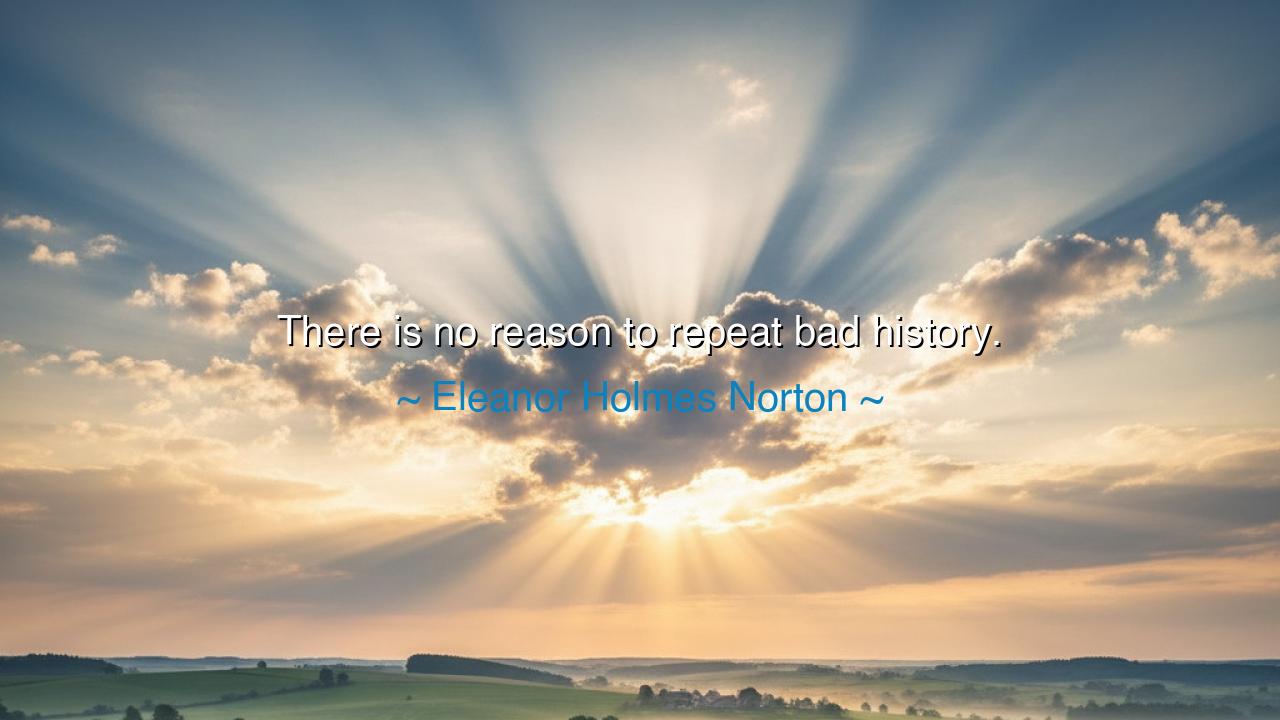
There is no reason to repeat bad history.






“There is no reason to repeat bad history.” – Eleanor Holmes Norton
Thus spoke Eleanor Holmes Norton, a voice of reason and justice, a woman forged in the fires of the American civil rights struggle and tempered by wisdom. Her words, brief yet eternal, carry the sound of truth spoken through generations: that history, though it teaches, should not be relived in its sorrows. In this single line, she summons both memory and responsibility. For while we cannot undo what has been done, we can choose not to walk again through the same valleys of ignorance and cruelty. “There is no reason to repeat bad history,” she declares — a statement both moral and practical, reminding humanity that suffering once endured becomes senseless when repeated by choice.
The origin of her insight lies in the long struggle for equality — a struggle that has defined her life and the life of her nation. Born in a time when segregation still scarred the land, Eleanor Holmes Norton rose as an advocate for human rights and justice. She saw, as many before her did, that the lessons of the past were being ignored: that the ghosts of discrimination, war, and division kept returning, disguised in new forms. Her words came as a rebuke to complacency — to those who, though armed with knowledge of history’s tragedies, allow them to be repeated through silence or indifference. To her, history is a teacher that speaks not in riddles but in warnings; only the foolish refuse to listen.
To understand her meaning, let us look upon the chronicles of humanity. The twentieth century alone stands as a monument to this truth. Twice the world was consumed by global war, each born from pride, greed, and blindness. After the First World War, the victors promised that such a conflict would never happen again. Yet within a generation, the same errors — nationalism, hatred, the thirst for domination — led to an even greater catastrophe. Tens of millions perished because humankind, though armed with memory, had not yet learned wisdom. Such is the tragedy Norton speaks against: that knowledge without reflection becomes powerless, and remembrance without reform is merely the echo of pain.
Closer still to her heart lies the history of injustice in her own land. America, born with words of liberty, long denied that liberty to millions. Even after slavery’s chains were broken, its shadow endured in segregation, poverty, and exclusion. The struggle of the 1960s — the marches, the sit-ins, the songs of freedom — was the nation’s great reckoning with its own “bad history.” And yet, Norton warns, the work is not finished. Prejudice can wear new masks; oppression can return under new names. Her call is not only to remember the past but to act differently because of it. To repeat bad history is not merely error — it is betrayal.
Her quote also holds meaning beyond politics. It speaks to the soul of every individual. Each person, too, has a history — a trail of choices, mistakes, and lessons. To live wisely is to heed that inner record, to avoid walking twice into the same fire. There is no virtue in stubbornness, no honor in repeating pain. The wise learn from the ashes of their own failures, just as nations must learn from the ruins of their past. Norton’s wisdom thus applies to both the private and the collective, to both the heart and the world.
And yet, her words carry not despair, but hope. For to say there is “no reason” to repeat bad history is to affirm that we are capable of change. We are not prisoners of the past unless we choose to be. Every generation is given the gift of memory and the power to do better. The scars of yesterday can become the strength of tomorrow if we learn from them — if we study them not with guilt, but with determination. History becomes bad only when it is ignored. When understood, it becomes light.
So take this teaching into your heart, O child of time: learn, remember, and rise. Study your history, but do not chain yourself to it. Honor the struggles of those who came before, but do not reenact their despair. When hatred tempts you, recall the wars it has caused; when injustice whispers, remember the cost of silence. Each act of wisdom, each moment of compassion, is a victory over the repetition of evil. For as Eleanor Holmes Norton reminds us, we are not doomed to relive our worst days — unless we refuse to learn from them. Let this be your creed: to remember, not to repeat; to honor, not to imitate; to build, not to destroy. Thus will the future become the redemption of the past.






AAdministratorAdministrator
Welcome, honored guests. Please leave a comment, we will respond soon